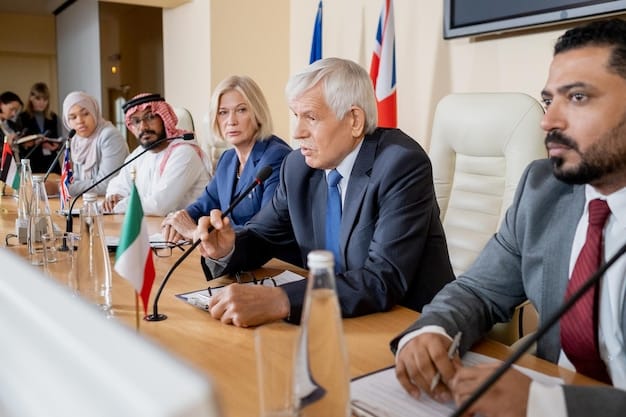What Happens When the US Rejoins the Paris Agreement?

The potential consequences of the US rejoining the Paris Agreement include strengthened global climate action, enhanced economic opportunities in renewable energy, and restored international credibility, but also potential domestic political challenges and the need for significant policy adjustments.
The United States’ decision to rejoin the Paris Agreement marks a significant shift in global climate policy. But what are the potential consequences of the US rejoining the Paris Agreement? Let’s explore the impacts, both positive and challenging, of this pivotal move.
Re-establishing Global Climate Leadership
The return of the US to the Paris Agreement is a crucial step in reaffirming its commitment to addressing climate change on a global scale. This move signals a willingness to collaborate with other nations in reducing greenhouse gas emissions and mitigating the impacts of a warming planet.
Rejoining the agreement isn’t just about symbolism; it’s about actively participating in international efforts to set emission reduction targets and implement climate policies. This renewed involvement can significantly influence other countries to strengthen their own commitments.
Restoring International Trust
One of the most immediate consequences of the US rejoining is the restoration of trust among nations. The previous withdrawal had strained relationships and undermined the collective effort to combat climate change. Now, the US can work collaboratively to restore trust.
- Renewed diplomatic relations focused on climate action.
- Increased collaboration on research and development of clean technologies.
- Shared commitment to providing financial support to developing nations.

The re-establishment of global climate leadership by the US is essential for achieving the goals of the Paris Agreement and securing a sustainable future for all.
Economic Opportunities in Renewable Energy
A significant consequence of the US rejoining the Paris Agreement is the potential for substantial economic growth in the renewable energy sector. The agreement encourages investments in clean energy technologies and sustainable practices, creating numerous opportunities for businesses and workers.
The shift towards renewable energy sources like solar, wind, and hydro power can stimulate innovation, create jobs, and reduce reliance on fossil fuels. This transition not only benefits the environment but also boosts economic competitiveness.
Job Creation and Innovation
The renewable energy sector is a burgeoning field that promises to generate employment across various sectors, from manufacturing and installation to research and development. The renewed commitment to the Paris Agreement will accelerate job creation.
The focus on clean energy technologies will also spur innovation, leading to the development of more efficient and cost-effective renewable energy solutions, enhancing the overall competitiveness of the US economy.
Attracting Investments and Financing
The US rejoining the Paris Agreement can attract both domestic and international investments in renewable energy projects. Investors are more likely to support initiatives that align with global climate goals.
- Increased funding for renewable energy infrastructure.
- Incentives for businesses to adopt sustainable practices.
- Expansion of green financial instruments.
The economic opportunities in renewable energy represent a win-win situation, driving economic growth while mitigating climate change.
Setting Ambitious Emission Reduction Targets
A critical aspect of the US rejoining the Paris Agreement involves setting ambitious emission reduction targets. These targets serve as benchmarks for measuring progress and driving action across various sectors of the economy.
The US’s commitment to reducing greenhouse gas emissions requires a comprehensive strategy that includes policies, regulations, and investments that support the transition to a low-carbon economy.
Achieving Net-Zero Emissions
One of the overarching goals of the Paris Agreement is to achieve net-zero emissions by mid-century, requiring substantial reductions in greenhouse gas emissions across all sectors – from energy and transportation to agriculture and manufacturing.
The US can lead by example by setting ambitious interim targets, such as reducing emissions by 50% by 2030, and implementing policies that incentivize decarbonization.
Policy and Regulatory Changes
Ambitious emission reduction targets necessitate policy and regulatory changes that promote clean energy, energy efficiency, and sustainable land use practices. These changes can include carbon pricing mechanisms, renewable energy standards, and stricter emission regulations.
- Implementing carbon pricing mechanisms to incentivize emission reductions.
- Establishing renewable energy standards for electricity generation.
- Enhancing energy efficiency standards for buildings and appliances.
The setting and achievement of ambitious emission reduction targets are essential for mitigating climate change and ensuring a sustainable future.
Navigating Domestic Political Challenges
Rejoining the Paris Agreement isn’t without its challenges, particularly in navigating domestic political obstacles. Climate change remains a deeply politicized issue in the US, with varying opinions on the urgency and necessity of climate action.
Overcoming political divisions and building a broad consensus on climate policies is critical for the long-term success of US participation in the agreement. This requires effective communication, stakeholder engagement, and bipartisan cooperation.
Opposition and Resistance
The presence of political opposition and resistance towards climate policies means that there will be resistance to the implementation of the Paris Agreement’s goals. It is essential for advocates of climate action to engage in constructive dialogue.
Building public support for climate action and demonstrating the economic benefits of sustainable practices can help overcome resistance and foster a more unified approach to climate policy.
Policy Implementation and Enforcement
Even with political support, implementing and enforcing climate policies can be complex and challenging. Ensuring that policies are effective, equitable, and economically viable requires careful planning and execution.

Effective policy implementation is critical for achieving the long-term goals of the Paris Agreement and ensuring that the US remains a leader in climate action.
The US participation in the Paris Agreement necessitates overcoming domestic political hurdles to achieve successful and long-lasting climate action.
Addressing the Impacts on Various Sectors
The implementation of climate policies under the Paris Agreement can have varied impacts on different sectors of the economy. Some sectors may benefit from the transition to a low-carbon economy, while others may face challenges and require support.
Understanding these impacts and developing tailored strategies to address them is crucial for ensuring a just and equitable transition. This involves investing in workforce development, supporting affected communities, and promoting sustainable practices across all sectors.
Energy Sector Transformation
The energy sector is undergoing a significant transformation as the US transitions away from fossil fuels and towards renewable energy sources. This transition requires investments in new infrastructure, workforce retraining, and policies that support the growth of clean energy industries.
Ensuring a just transition for workers and communities dependent on fossil fuels is a critical part of this transformation.
Agriculture and Land Use
Agriculture and land use practices play a significant role in greenhouse gas emissions. The Paris Agreement encourages sustainable agriculture and land management practices that reduce emissions and enhance carbon sequestration.
Supporting farmers and land managers in adopting climate-friendly practices can help mitigate climate change while also improving agricultural productivity and resilience.
To ensure alignment with the Paris Agreement climate goals, a detailed approach is required that deals with the effects on distinct economic sectors, emphasizing a transition that is just and equitable.
Maintaining Long-Term Commitment
The effectiveness of the US participation in the Paris Agreement hinges on maintaining a long-term commitment to climate action, regardless of political shifts or economic fluctuations. This requires building institutional mechanisms that ensure continuity and resilience in climate policy.
Establishing bipartisan support for climate action, integrating climate considerations into government decision-making, and fostering a culture of sustainability across society are essential for achieving long-term success.
Building Institutional Resilience
Creating institutions that promote long-term climate action, regardless of political changes. For instance, independent climate advisory bodies can give ongoing advice and support.
- Establishing independent climate advisory bodies.
- Integrating climate considerations into government decision-making.
- Fostering a culture of sustainability across society.
Engaging Future Generations
Encouraging pro-environmental behavior in society requires educating and engaging the youth. They are essential in supporting sustainable practices. This will ensure a long-term commitment to fulfilling the Paris Agreement.
The continuity and success of climate action are greatly dependent on the US maintaining its long-term commitment to tackling climate change, irrespective of political or economic challenges.
| Key Aspect | Brief Description |
|---|---|
| 🤝 Global Cooperation | Restores trust and collaboration on climate goals. |
| 🌱 Renewable Energy | Stimulates job creation and innovation in clean energy. |
| 🎯 Emission Targets | Sets ambitious goals for reducing greenhouse emissions. |
| 🏛️ Political Challenges | Requires overcoming domestic resistance to climate action. |
Frequently Asked Questions (FAQ)
▼
The main goal is to limit global warming to well below 2 degrees Celsius, preferably to 1.5 degrees Celsius, compared to pre-industrial levels. This involves reducing greenhouse gas emissions significantly.
▼
The US can benefit through job creation in renewable energy sectors, technological innovation, and increased investment in green infrastructure. It also aligns the US with global markets focused on sustainable products.
▼
Challenges include political opposition to climate policies, the need for significant investments in clean energy, and the transformation of traditional industries. These require bipartisan support and strategic planning.
▼
Rejoining strengthens international trust and cooperation, allowing the US to play a leading role in global climate negotiations. It also fosters collaboration on climate research and technology development.
▼
Businesses play a crucial role by adopting sustainable practices, investing in renewable energy, and developing innovative green technologies. Their involvement is essential for driving the economic transition to a low-carbon future.
Conclusion
In conclusion, the potential consequences of the US rejoining the Paris Agreement are far-reaching, encompassing economic, political, and environmental dimensions. While challenges remain, the opportunities for global climate leadership and sustainable development are immense.





